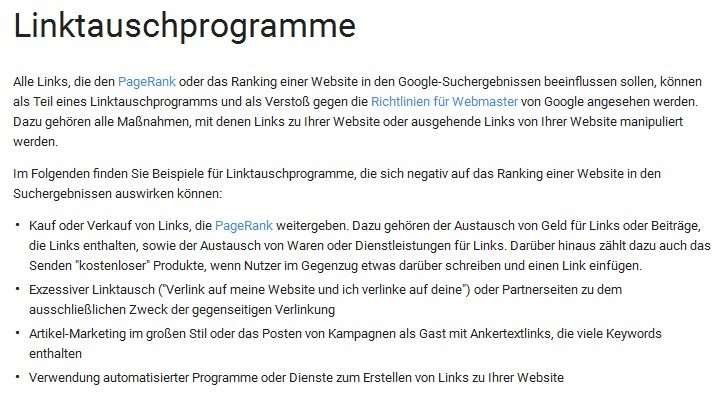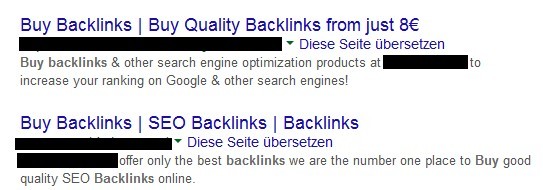
Blog Post
SEO

Nadine
Wolff
published on:
16.11.2017
Future of Link Building – Which Strategies and Backlinks Are Effective
Table of Contents
Building backlinks for good Linkbuilding – necessary, redundant, or even dangerous? Ever since the first domains received warnings from Google itself about questionable links years ago, the topic of backlink building has been contentious. Experts are divided, and laypeople are uncertain. Every year anew, the question arises: Which strategies are suitable for building backlinks and which ones still adhere to Google's quality guidelines for generating backlinks?

Fig.1 Link exchange programs
Basics of backlink building: What is a backlink?
To understand what a backlink is and how backlink building works, it's important to clarify the question, "What is a link?" A link or hyperlink is essentially a reference in a text that functionally allows a jump to another page or document. These references can also be used within one's own website.
A backlink is a reference from one website to the URL of another website. This can be set for various reasons and at different positions on a page, such as in the footer or from within the content. Both text and images can be linked.
Additionally, there is the option to mask links with "nofollow." This designation tells search engines not to follow these links. Such "nofollow" links have less value from an SEO perspective than "dofollow" links but are still a part of a natural backlink profile. Therefore, they should not be neglected when generating backlinks, especially if they are from trust sites with high authority that ideally get clicks from visitors and bring referral traffic to the page.
When assessing the quality of a backlink in backlink building, the thematic relevance of the linking page and its trust are most important. The goal is thematically relevant backlinks, whether as "nofollow" or "dofollow" links, from websites that have high authority in Google's ratings. However, for a balanced mix in the link profile, links from less known sites within one's theme area are also important.
In addition to links, there is also internal linking, which plays an important role in search engine optimization but is not the topic of this article.
A reminder: What Google's Webmaster Guidelines say about backlink building
Google's position is clear: Any kind of buying or selling backlinks that are not marked as paid links constitutes a violation of the Webmaster Guidelines. Also, a large number of guest posts with optimized anchor texts are not welcome, nor are site-wide footer links on other domains.
The long list of unacceptable techniques for setting backlinks leaves little room for link builders, and one might even get the impression that active backlink building is not permitted. However, common practice often tells a different story.
The reality: Buying backlinks still works
A quick Google search for the term "buy backlinks" shows: the business model "money for backlinks" still exists, including very dubious offers that experienced SEOs avoid. A backlink analysis in various industries also reveals numerous backlinks that evidently do not comply with Google's guidelines.

Fig.2 Buying links in SEO today
Why do these domains with a sometimes questionable link profile still rank? On one hand, even a constantly evolving algorithm does not recognize every dubious link. On the other hand, it is often suspected that domains maintain their visibility despite their spam links and not because of them. Especially established domains can generally "get away with" more than newer domains or smaller domains with less trust.
Furthermore, there are still many ways to buy backlinks without being noticeable to search engines and users. The times of mass purchased links at package prices are long gone, but link buying is by no means dead.
A violation of Google Guidelines is not necessarily the case just because money is involved. Even a paid case study in a major industry magazine or an advertorial, for example, falls under purchased links. If these links are masked with "nofollow" as Google desires and the article is possibly even marked as an advertisement, the guidelines are followed.
So is this link useless from an SEO perspective? As mentioned above, "nofollow" links are also a natural part of a link profile. Furthermore, brand or company mentions help to strengthen a website and increase its trust. This is especially true for locally operating companies but also for regional brands. Those who ultimately want to protect themselves from penalties should regularly check their backlinks with the help of numerous tools.
Free backlinks with content marketing
After the great uncertainty around backlink building, content marketing seemed to be the new solution – "link earning" instead of "link building." However, practice shows that this approach may be fundamentally correct and sensible but is by no means easy to implement. Creating high-quality content alone does not generate links.
There is still effort required to strategically promote these contents on target group-relevant platforms. Given the flood of content and the numerous requests to share, link, and promote that every website operator with some visibility receives, the "outreach" strategy is not easy. It is necessary to stand out positively and offer high quality and value. And that's easier said than done.
The demands on the content itself are growing. Differentiating one's content from that of competitors is becoming more difficult and often requires significant effort and strategic planning. A promising, albeit labor-intensive, approach is:
What already exists on the topic, and how can your own content become even better than anything that is already online? The bar should not be set lower because otherwise, the content does not qualify to earn "voluntary" links and generate attention.
Our tip: build sustainable backlinks
In the past, links were often built from websites or blogs that were placed in such a way that they could be read and evaluated by search engines but barely noticed by human visitors. The current approach should be different: Where can your own contents (including the mention of the company or brand and backlink) be placed where they will be seen by a relevant target audience and thus have a chance to actually be clicked on and perhaps even generate conversions?
When building links, the traffic they generate is almost as important as the value the link holds for search engine optimization.
The fact is that placing links becomes slightly more difficult every year and cannot be automated. The path to success often lies in building personal relationships with other companies and influencers, that is, multipliers.
It's important to stand out from the mass of requests through personal address and, ideally, a partnership from which both sides benefit, going far beyond mere link placement. Brands that have already acquired a certain trust and recognition sometimes find it easier to acquire backlinks.
Which measures are still suitable for building backlinks? The following list shows a selection of various options, including many ways to generate free backlinks (not factoring in the amount of work required):
Classic (online) press work: Primarily for brand building, with the added benefit of setting backlinks
Resource lists: Articles that collect links on a specific topic offer high potential to add another link to a high-quality resource. Examples include white papers, studies, instructional blog posts, or video tutorials.
Partnerships: Which companies are connected with your own products and services? Suppliers, users, other cooperations?
Relevant communities and portals: For most industries, there are specialized portals that often offer various opportunities to get involved: directories of all companies, technical articles, interviews, product news, trade show reports, etc.
Case studies: Companies that are pioneers in their industry in a certain aspect, that have collected market figures, or have otherwise gathered relevant data or experiences are often interesting for trade magazines or economics journals.
Testimonials: Customer testimonials for products, services, software, etc., are sometimes "rewarded" with a link. Where does your own company successfully use third-party products or benefit from services?
Interviews: Interviews with other experts on your own site (who sometimes place backlinks on their sites), but above all, the positioning of an expert from your own company as an interview partner in a relevant magazine, can generate thematically relevant backlinks.
Expert panels: Magazines sometimes publish articles in which various experts are questioned about a particular topic. Here, it pays to establish contact in advance to be considered for similar opportunities in the future.
Broken links: Backlink tools and Google Search Console help find links that point to pages that are no longer available. It can be worth regularly checking your own backlinks. In the case of broken links, the approach is to contact and request a correction of the link since the site owner also benefits from functioning links.
Turning mentions into links: Which blog posts or news articles report about the company? Where might it be successful to request a link, possibly to a subpage relevant to the report, that also offers added value to readers?
Generating mentions and local backlinks
Not only for companies with retail stores and local services does it make sense to consider local sources as a supplement for backlink building or linkbuilding. The possibilities for creating locally related links are diverse:
Local networking: Local business groups, associations, or other business associations help to establish contacts and often provide a backlink in the company profile on the website.
Universities: Whether through offering jobs or internships at the company, special offers for students, or company tours that students ideally report on, engagement with local university students can pay off.
Events: If you cannot or do not want to host your own local event, you have the option to sponsor an event or be listed as a speaker, gaining a backlink in the process. This also aids in backlink building.
Local business relationships with other on-site companies: Building personal contacts can not only lead to new strategic partnerships but also increase the circle of multipliers and build backlinks. The foundation should always be how both sides can benefit from the business relationship.
Local directories: In addition to industry-specific directories, relevant local directories should not be neglected, which gather all companies in a region, city, or district and usually set backlinks.
Local blogs and other media: Blogs, district newspapers, local journals, and other regional or local media gladly report on companies on-site that are active, have a special success story, or are otherwise in conversation.
Sponsorships for local sports teams: Not only meaningful involvement in youth development or support for a small local club, but also an opportunity to be mentioned and linked as a sponsor on the website, as well as achieving mentions in the local press through competitions.
It is important: Not all the suggested approaches focus solely on building backlinks. Mentions can also improve local visibility.
In conclusion, regarding backlink building, it's clear that backlinks are still an essential part of the algorithm and should not be ignored. The days of automated link buying are long over, instead, creative individual strategies, active personal relationship building, and a focus on genuine added value that clearly stands out from existing content are required.
What can we do for you?
Do you want to improve the visibility of your website or online shop through backlinks? We support you with OnSite and OffSite SEO analyses and strategies for implementation. Contact us!

Nadine
Wolff
As a long-time expert in SEO (and web analytics), Nadine Wolff has been working with internetwarriors since 2015. She leads the SEO & Web Analytics team and is passionate about all the (sometimes quirky) innovations from Google and the other major search engines. In the SEO field, Nadine has published articles in Website Boosting and looks forward to professional workshops and sustainable organic exchanges.


